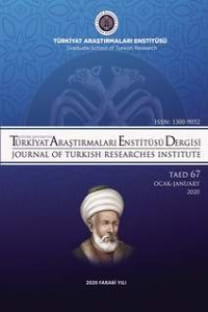HAMDÎ’NİN YÛSUF U ZÜLEYHÂ MESNEVİSİNDE TERCÜME VE YERLİ SÖYLEM / TRANSLATION AND NATIONAL DISCOURSE IN HAMDİ’S MASNAVI YUSUF AND ZULAYHA
Öz
ÖZ Yûsuf u Züleyhâ hikâyesi Türk edebiyatında en fazla işlenen konulardan biridir. Hamdî’nin Molla Câmî’nin eserini örnek alarak yazdığı Yûsuf u Züleyhâ mesnevisi ise Türk edebiyatında en çok beğenilen Yûsuf kıssalarından biridir. Birçok bölümde tercüme yoluyla Câmî’nin eserinden yararlanan şair, hikâyenin oluşturulmasında ona bağlı kalmamış, kıssayı halk arasında yaygın şekliyle anlatmıştır. Câmî’de mevcut olmayan ancak eserde önemli bir yer tutan bu unsurlar değerlendirildiğinde Hamdî’nin Türk edebiyatında kendisinden önce yazılmış olan Yusuf kıssalarından da yararlandığı fakat edebi bakımdan onları aştığı anlaşılmaktadır.Anahtar Sözcükler: Yûsuf u Züleyhâ, Hamdî, Molla Câmî, tercüme, metinlerarasılıkABSTRACTThe story “Yusuf u Züleyha” (Yusuf and Züleyha) is one of the most common subjects in Turkish Literature. This masnavi which is written by Hamdi based on the work “Molla Cami” is one of the most admired Yusuf anecdotes in Turkish Literature. The poet, who made use of the work “Cami” in a grate scale in different parts by translation, wasn’t loyal to the original work and told the anecdote as it is widely known by public. As these parts, that do not have a volume in Cami but in the work, are investigated, it is understood that Hamdi had made use of the previous Yusuf stories but he had exceeded him. Key words: The story “Yusf-u Zuleyha”, Hamdi, Molla Cami, translation, intertextuality.
- ISSN: 1300-9052
- Yayın Aralığı: Yılda 3 Sayı
- Yayıncı: Atatürk Üniversitesi Türkiyat Araştırmaları Enstitüsü
Sayıdaki Diğer Makaleler
Erkan CEVİZLİLER, Erkan CEVİZLİLER
Melek TOPARLAK, M. Abdullah ARSLAN, Melek TOPARLAK
ATATÜRK DÖNEMİ TÜRKİYE’SİNDE TOPRAK MÜLKİYET DAĞILIMI İLE İLGİLİ BAZI DÜZENLEMELER
ŞER‘İYYE SİCİLLERİNE GÖRE XVII. YÜZYILDA AYNTAB ŞEHRİNDE AİLENİN OLUŞUMU (1600–1650)
19.YÜZYIL BATI SEYAHATNAMELERİNDE ORTADOĞU VE İSTANBUL İMGESİ: FRANÇOİS RENÉ DE CHATEAUBRİAND ÖRNEĞİ
TARİHİ KAYNAKLAR IŞIĞINDA KAPUTRU SAVAŞI / Kaputru War in The Light of Historical Sources
